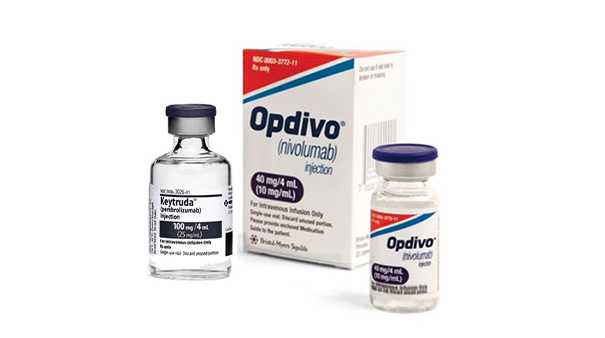BMS' Opdivo+Yervoy could become first choice for certain colorectal cancer patients

Bristol-Myers Squibb’s Opdivo and Yervoy combination could become first line treatment for a small group of metastatic colorectal cancer patients with aggressive tumours, on the basis of data announced at this year’s ESMO 2018 Congress in Munich.
BMS’ arch rival in cancer immunotherapy Merck & Co already has its Keytruda approved in second line for solid tumours with high expression of mutations known as microsatellite instability (MSI-high), regardless of where they are in the body.
But this new data could allow BMS to reach around 4% of metastatic colorectal cancers which are MSI-high, also called mismatch repair deficient, ahead of Merck & Co.
When treated with first line chemotherapy, patients with MSI-high tumours have shorter survival, around 14-19 months, compared with those with non MSI-high tumours, who live for between 17-25 months.
BMS’ phase 2 CheckMate-142 trial previously showed that in patients with MSI-high metastatic colorectal cancer that is resistant to chemotherapy, immunotherapy with Opdivo (nivolumab) and low-dose Yervoy (ipilimumab) provided durable clinical benefit and manageable side effects, leading to approval by the FDA.
But new data from CheckMate-142 announced at the European Society for Medical Oncology (ESMO) conference showed the combination worked in patients who have received no prior treatment for MSI-high metastatic colorectal cancer, based on results from 45 patients.
The median age was 66 years and 51% were male. Patients were followed-up for a median of 13.8 months for the primary endpoint of objective response rate.
The objective response rate was 60% and 7% of patients with a complete response. Some 84% of patients had tumour shrinkage.
It took a median of 2.6 months to respond to treatment. The median duration of response, median progression-free survival, and median overall survival have not yet been reached. The 12-month progression-free survival and overall survival rates were 77% and 83%, respectively.
Other trials have tested high-dose Yervoy combined with Opdivo, but CheckMate-142 used low-dose Yervoy with Opdivo, which resulted in less toxicity. Treatment-related grade three and four toxicities were reported in 16% of patients and 7% discontinued therapy due to treatment-related adverse events.
Study author Prof Heinz-Josef Lenz, co-leader, Gastrointestinal Cancers Program, University of Southern California Norris Comprehensive Cancer Center, Los Angeles, said: “The combination of low-dose ipilimumab and nivolumab has a durable clinical response and is well tolerated as first line treatment in patients with MSI-high metastatic colorectal cancer. The data suggest that nivolumab and ipilimumab may be a first line treatment option for these patients.”
Commenting on the results for ESMO, Prof Thierry André, head of medical oncology, Hôpital Saint-Antoine, Assistance Publique – Hôpitaux de Paris, France, said: “Nivolumab plus low-dose ipilimumab is effective in most patients with MSI-high metastatic colorectal cancer. Patients improve dramatically and some return to work. It means healthcare systems can be confident that resources are being targeted effectively. This is in contrast to other metastatic cancers (melanoma, lung or kidney) where it is more difficult to select patients who benefit from immunotherapy.”
BMS could ask for FDA approval based on these results, André noted, but will likely have to produce phase 3 data for approval by the European Medicines Agency.
The ongoing phase 3 KEYNOTE-177 study in MSI-high metastatic colorectal cancer is comparing first line treatment with pembrolizumab versus chemotherapy with or without targeted therapy and the first results are expected in 2019.
Another question posed by André is whether Opdivo monotherapy is more effective than the combination, although indirect comparisons suggest the combination is the better option.












